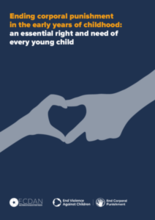Over one billion children experience violence every year, with devastating short and long-term consequences for individuals and societies.
Corporal punishment is the most common and widely accepted form of violence against children, and most likely to be experienced early in life; studies show that 3 in 4 children under five years are spanked, hit with objects, or beaten as punishment. Sadly, their vulnerability and exposure to violence has increased during the pandemic.
The pervasiveness of violence against young children in the home, childcare, and other settings is particularly concerning as early child development provides the building blocks for lifelong health, educational achievement, economic wellbeing, and societal progress. In the first years of life, children's brain architecture develops rapidly in response to experiences and environments. To achieve their developmental potential, children need nurturing care, including health and nutrition, supportive relationships, and protection from violence. In contrast, exposure to violence can overload children's stress response and other biological systems, disrupt the brain's circuitry development, and lead to long-term negative consequences.
This briefing, authored by Jorge Cuartas with End Violence and the Early Childhood Development Action Network examines evidence from research on the impacts of violent punishment on young children, global prevalence and progress towards universal prohibition, and strategies to end corporal punishment. It adds yet more weight to the call that all countries must take steps to prohibit and eliminate violent punishment of all children without delay.

